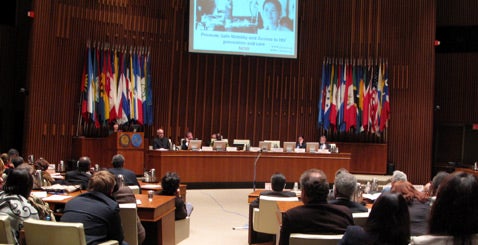
 Three public health initiatives originated by countries of the Southern Hemisphere were singled out by the Pan American Health Organization (PAHO) this week as "Winning Global Health Solutions" developed for and by countries of the South.
Three public health initiatives originated by countries of the Southern Hemisphere were singled out by the Pan American Health Organization (PAHO) this week as "Winning Global Health Solutions" developed for and by countries of the South.
Health initiatives from Central America, Pakistan, and the Philippines showcased as part of Global South-South Development Expo 2009
Washington, D.C., Dec. 17, 2009 (PAHO) — Three public health initiatives originated by countries of the Southern Hemisphere were singled out by the Pan American Health Organization (PAHO) this week as "Winning Global Health Solutions" developed for and by countries of the South.

Photo by Lorely Ambriz (PAHO/WHO)
The initiatives were home-grown programs addressing workers' health and safety in Central America, pneumonia mortality in children in Pakistan, and hygiene-related and parasitic diseases in children in the Philippines. They and several other health initiatives originated by and for developing countries were showcased at the South-South Development Solutions Forum on Global Health, organized by PAHO and the U.N. Development Program (UNDP) as part of the Global South-South Development Expo 2009, taking place at World Bank headquarters in Washington, D.C., this week.
"Today's activity is about breaking traditional molds and concepts, about unleashing the creative capacities of the countries of the South in order to respond to the health and equity challenges of our time," said PAHO Director Dr. Mirta Roses.
The "Winning Global Health Solutions," which were recognized for their leadership, partnership, and innovation, respectively, were:
The Lady Health Workers of Pakistan, who use a Community Case Management (CCM) model to reduce high rates of pneumonia mortality among children. Developed by Save the Children and the Ministry of Health of Pakistan, the CCM model combines enhanced training of Lady Health Workers in detection and treatment of acute respiratory infections, with the provision of oral amoxicillin, essential medical equipment, supervision by formal healthcare providers, and community mobilization to get parents to seek care for children under 5. The initiative has trained 270 Lady Health Workers since 2007 and has had a positive impact on some 75,000 children.
SALTRA ("Program on Work and Health in Central America"), a pioneering university-based program that builds national and regional capacities in Central America to prevent occupational hazards. The program seeks to reduce risks and promote health among workers in construction, the sugar cane industry, hospitals, and the informal sector. It has spearheaded seven pilot projects for surveillance of exposures to and effects of pesticides, carcinogenic agents, and fatal injuries; has produced nine outbreak and hazard assessment studies; and has created a network of 450 occupational safety and health professionals from throughout Central America.
Fit for School, a program developed by the Department of Education and the League of Provinces of the Philippines to respond to high rates of preventable diseases among Filipino school children. It combines daily supervised hand washing with soap, tooth brushing with fluoride toothpaste, and semi-annual deworming on a mass scale to reduce respiratory tract infections, diarrhea, parasites, and tooth decay in children. In just two years, the program has shown such success that the Department of Education has designated it a "national flagship program" and plans to expand it to reach 50 percent of Filipino children by 2012. The initiative is supported by the German Development Agencies CIM and GTZ.
In addition to the Winning Global Health Solutions, the PAHO Forum showcased several other South-South Solutions as part of a panel on "Responses of the South in a Time of Crisis: Innovative Partnerships for Solutions in Global Health." They included:
- Community-directed treatment of onchocerciasis (river blindness) and other "neglected diseases" in Nigeria.
- The Brazilian Network of Human Milk Banks.
- Prevention of HIV/AIDS among migrant workers in Thailand.
- Mobile phone—based epidemiological data collection (EpiSurveyor).
- The Latin American and Caribbean Center on Health Sciences Information, a PAHO/WHO technical center.
This week's Global South-South Development Expo 2009 is designed to showcase successful evidence-based interventions originated by developing countries to address their own development challenges. The Expo enables developing countries and their development partners—including donor agencies, agencies of the United Nations system, and private sector and civil society organizations—to showcase solutions that are rooted in the historical, political, economic, social and geographic conditions specific to the originating countries.
Links of Interest:
Winning Global Health Solutions
Global South-South Development Expo
PAHO was established in 1902 and is the world's oldest public health organization. It works with all the countries of the Americas to improve the health and quality of life of the people of the Americas and serves as the Regional Office for the Americas of the World Health Organization (WHO).
For more information please contact: Donna Eberwine-Villagrán, Tel. 202 974 3122.



